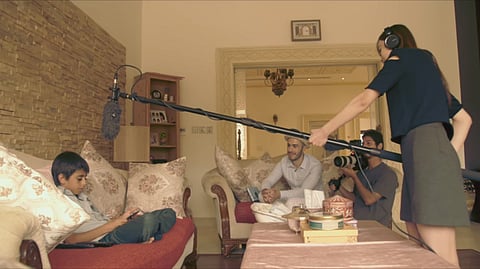‘Nanny Culture’ documents UK nanny in the UAE
The documentary follows Julie Mcilvenny in an Emirati household

Nanny Culture, a documentary filmed in Abu Dhabi, follows a Western nanny who temporarily relocates from England to the UAE to look after the six children of an Emirati family.
The documentary, which features a few scripted moments, was produced by local organisation Anasy Media and directed by the British director Paul James Driscoll.
Driscoll spoke to Gulf News tabloid! in November of last year, shortly after the film premiered in the UK. Since then, Nanny Culture has been picked up by film festivals around the world, from Canada to Ireland, and has won several awards in America, though it still does not have a UAE release date.
“The original idea was for it to be a satirical comedy mockumentary,” said Driscoll. “When I was exploring the idea more, it seemed to me that it might be a good idea to have something that was real. Something that people could relate to as a true story.”
Julie Mcilvenny is welcomed by an Emirati family with three boys and three girls between the ages of two and 13. The nanny, who was born in Zimbabwe but grew up in the UK, joins a roster of domestic staff in the household, including a Pakistani driver, a chef and Indonesian and Filipino nannies.
“She’s a white, Western nanny — I guess colour isn’t really a thing, it’s just where she’s from. I thought it would be interesting to see what the difference [would be] with the children: do they treat her different to the other nannies — the South-East Asian nannies?”
Driscoll, a former UAE-based journalist who currently resides primarily in the UK, said there were other families lined up to feature in the film. But as he was working on the storyboard in London, people began pulling out of the project, a fact that was kept from him to save him from worrying.
“You know what it’s like in the UAE. It’s very rare to get a family to agree to being filmed in their house. Especially female members of the household — a wife, daughters,” said Driscoll.
“Anyone, really, in that environment, to have a three- or four-man crew come in and invade their personal space for five weeks, it’s a big thing to ask of someone. And [then] to ask for them to be okay to be televised or put on a big screen.”
The family they chose in the end was the perfect match for Driscoll, who described them as progressive, open-minded and professional. The children were well-behaved due to the presence of cameras, but tensions — some of which, Driscoll said, would make audiences cringe or laugh — did arise, particularly between the domestic staff.
The chef, who was one of Driscoll’s favourite ‘characters’ in the film, was “the most gregarious and outspoken member of the household staff. She’s really likeable — she’s kind of big, jolly, bubbly.” She had spent two years away from her child with a few more to go, a tough situation for any mother.
In comparison, Driscoll suggested, Mcilvenny’s feelings of loneliness over being temporarily separated from her family are “first-world problems, I guess you could say. It contrasts so starkly against the lives of the other people in the house.”
In one instance, the chef asks Julie why she isn’t wearing a uniform like the rest of the domestic staff.
“She can’t understand why this isn’t the case. And to Julie, it’s completely bizarre, because it would be beneath her to wear a uniform. It’s a completely absurd notion to her,” he said.
“But of course, to [the chef], she’s like, ‘Well, this is just a nanny. I’m a nanny, she’s a nanny, why is there this huge disparity between the two?’”
“It’s a look at nanny culture, but specifically Western nanny culture, and how that play of different cultures acts itself out within an Emirati household,” said Driscoll.
Producers Anasy Media, founded in 2007 under the patronage of Shaikh Nahyan Bin Mubarak Al Nahyan, Minister of Culture and Knowledge Development, are behind several documentaries about history, culture and present day issues.
Driscoll said that with this project, they wanted to make something that was “interesting and funny”. When they initially approached him, however, he wasn’t aware of Western nannies working locally.
“I said, well, there aren’t British nannies, are there, in the UAE?”
He found out that there were many, in fact, mostly employed by wealthy or royal families. A UK-based agency, Nannies Incorporated, who are featured in the film, connect the nannies with interested families. There’s a troubling disparity between their wages and the wages of non-Western nannies.
“They get paid way more than the South-East Asian nannies — a ludicrous amount more. Well, you know how much domestic nannies get paid, yeah? Normally they get paid [up to Dh1,500] a month, if they’re lucky,” said Driscoll.
Driscoll added the Western nannies earn anywhere between £700 to £1,000 a week (Dh3,366-4,809), and maternity nurses earn £1,000-£1,500 (Dh4,743-7,114) a week.
“It comes down to education and teaching the children good English,” said Driscoll. “They are a status symbol, as well.”


